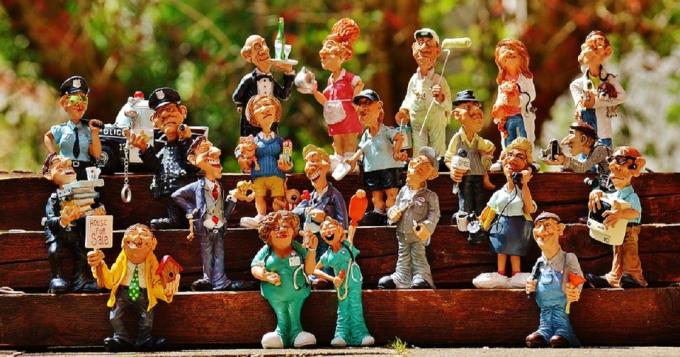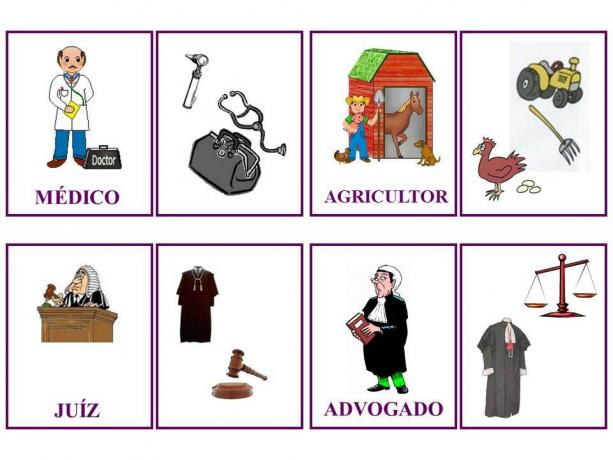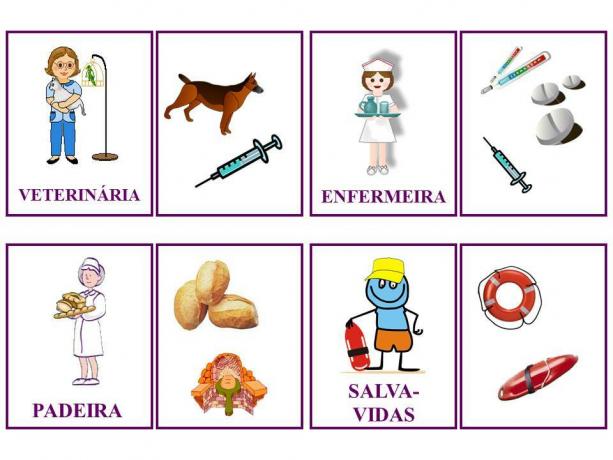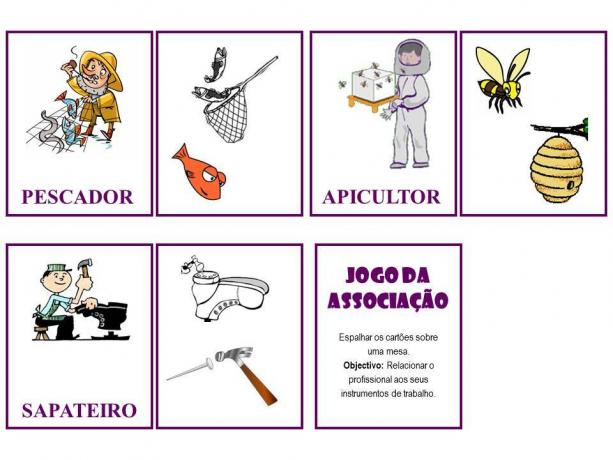We selected in this post several ideas and tips for your Early Childhood Education Professions Lesson Plan and Starter Series. There are several playful suggestions to work on classroom.
O Labor Day or Labor Day is celebrated annually in May 1st in several countries around the world.
Check out more:
Index

Ten to twelve relevant professions will be chosen
Example
Each day, the teacher will present one of the professions, taking pictures, songs and texts about them to the circle, mainly exploring the children's prior knowledge.
After that, an album of stickers will be prepared with the basic description of each profession and space for the student's illustration. The figure can be made by the teacher and numbered so that the student can stick it in the correct place. It would be interesting not to glue all the stickers on the same day.

Professions Lesson Plan for Early Childhood Education - Pretend Professions
How important it is for children to play, because when they are playing they develop attention, memory, autonomy, the ability to resolve problems, to socialize, awakens curiosity and imagination, in a pleasurable way and as an active participant in your process of learning.
Faced with this discovery, I asked the Maternal II group if they knew what it was to play make-believe. Only one child responded by giving the following example: "When I go to take a shower, I cross my arm under the shower and let the water fall, pooling it on my arm, then I swing my arm pretending it's mine drink". From this explanation other examples emerged.
Make-believe is an activity of great complexity, which triggers the use of creative imagination. Through make-believe, the child can relive situations that cause him excitement, joy, fear, sadness, anger and anxiety. She can, in this magical toy, express and work with strong emotions, which are often difficult to bear. And, from his actions in the games, he explores the different representations he has of these difficult situations, being able to better understand or reorganize them.
In games, children transform the knowledge they had previously into general concepts with which they play. For example, to assume a certain role in a game, the child must know some of its characteristics, its knowledge comes from the imitation of someone or something known, from an experience lived in the family or in other environments, from the report of a colleague or an adult, from scenes seen on television, in movies or narrated in books etc. Her source of knowledge is multiple, but these are still fragmented. (BRASIL, 1998 p.27).
With make-believe, children reflect their values and worldview acquired with their families, sharing with other children the experiences lived at home. Therefore, it is important that the teacher is attentive to intervene pedagogically, in order to overcome prejudices and provide healthy relationships.
As Oliveira (2010 p.163) comments, making believe “opens the way for autonomy, creativity, the exploration of meanings and senses. It also acts on the child's ability to imagine and act, articulated with other forms of expression. The games are also instruments for learning social rules”.
Children learn with each new game, develop forms of social interaction, modifying and receiving new content, in order to renew their learning. When she plays repeatedly, she savors the victory of acquiring new knowledge. For Kishimoto (2003, p.43) “by providing an imaginative situation through free activity, the child develops the initiative, expresses their desires and internalizes social rules”.
Provide opportunities for make-believe play, developing attention, memory, autonomy, the ability to solve problems, socialize, to arouse curiosity and imagination, in a pleasurable way and as an active participant in the process of learning.
Problem Situation: How can make-believe play help children's socialization and imagination development?

Class Plan Professions for Early Childhood Education – Who am I
Goals:
Methodology:
Assessment:
Didactic resources:
The following images can be used to help students formulate the tips:






Image source: Professor Bel's Activities
I also recommend:

Professions Lesson Plan for Early Childhood Education
From a very early age, children have a great interest in adult life, and that is how professions often appear in their make-believe games. While the children play, they elaborate and re-elaborate the professions, putting in the place of the parents or the teacher. Due to this interest, this unit of CEI PVL is dedicated to the study of professions and their importance to our society.
Exploring this theme within the school environment was very important because it makes it possible to expand students' knowledge regarding different professions and also collaborate so that everyone develops attitudes of respect and cooperation with people in their different functions.

Subscribe to our email list and receive interesting information and updates in your email inbox
Thanks for signing up.

